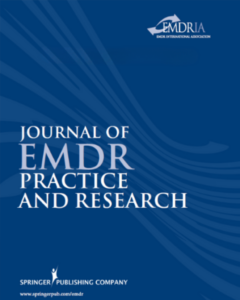Plasma brain-derived neurotrophic factor level may contribute to the therapeutic response to eye movement desensitization and reprocessing in complex post-traumatic stress disorder: A pilot study (Acta Neuropsychiatrica, 2012)
Investigating the relationship between plasma levels of brain-derived neurotrophic factor, nerve growth factor, and EMDR in complex PTSD.
Read MorePre- intra- and post-treatment eeg imaging of EMDR – neurobiological bases of treatment efficacy (European Psychiatry)
Electroencephalography was used for the first time to fully monitor neuronal activation during whole EMDR sessions.
Read MorePretreatment, Intratreatment, and Posttreatment EEG Imaging of EMDR: Methodology and Preliminary Results From a Single Case (Journal of EMDR Practice and Research)
Electroencephalography (EEG) was used to monitor neuronal activation during the whole EMDR session, including the autobiographical script.
Read MoreEMDR treatment for posttraumatic stress disorder, with focus on hippocampal volumes: A pilot study (The Journal of Neuropsychiatry and Clinical Neurosciences)
Preliminary study suggesting further consideration of the potential effects of psychotherapy on the neurobiology of psychiatric disorders
Read MoreDo horizontal saccadic eye movements increase interhemishpheric coherence? Investigation of a hypothesized neural mechanism underlying EMDR (Frontiers in Psychiatry)
This study aimed to investigate whether memory enhancement following bilateral eye movements is associated with increased interhemispheric coherence in the electroencephalogram (EEG).
Read MoreTraitement du souvenir dépendant du sommeil et mode d’action de l’EMDR (Journal of EMDR Practice and Research)
On pense que l’efficacité particulière de l’EMDR (désensibilisation et retraitement par les mouvements oculaires) dans le traitement de l’état…
Read MoreThe efficacy and psychophysiological correlates of dual-attention tasks in eye movement desensitization and reprocessing (EMDR) (Journal of Anxiety Disorder)
Findings indicate that eye movements in EMDR are beneficial & distinct psychophysiological changes may aid in processing negative memories.
Read MoreThe impact of taxing working memory on negative and positive memories (European Journal of Psychotraumatology)
This study examined the impact of taxing working memory on negative and positive memories.
Read MoreCortisol response following exposure treatment for PTSD in rape victims (Journal of Aggression, Maltreatment & Trauma)
Changes in salivary cortisol levels in adult female rape victims with PTSD, assigned to either prolonged exposure therapy or EMDR.
Read MoreElectrophysiological changes during EMDR treatment in patients with combat-related PTSD (Annals of General Psychiatry)
We have recorded a continual polygraph EEG, before, during and after EMDR therapy, in patient with combat-related PTSD.
Read MoreEMDR’s Neurobiological Mechanisms of Action: A Survey of 20 Years of Searching (Journal of EMDR Practice and Research)
We review neurobiological studies of EMDR, as well as theoretically driven speculative models to determine mechanisms of action.
Read MoreBilateral eye movement, attentional flexibility and metaphor comprehension: The substrate of REM dreaming? (Dreaming)
In a study involving individuals who had recently experienced significant loss or trauma, we found that experimentally induced saccadic eye movements decreased reaction times to unexpected stimuli among those reporting traumatic distress and increased reaction times among those reporting separation distress.
Read More



